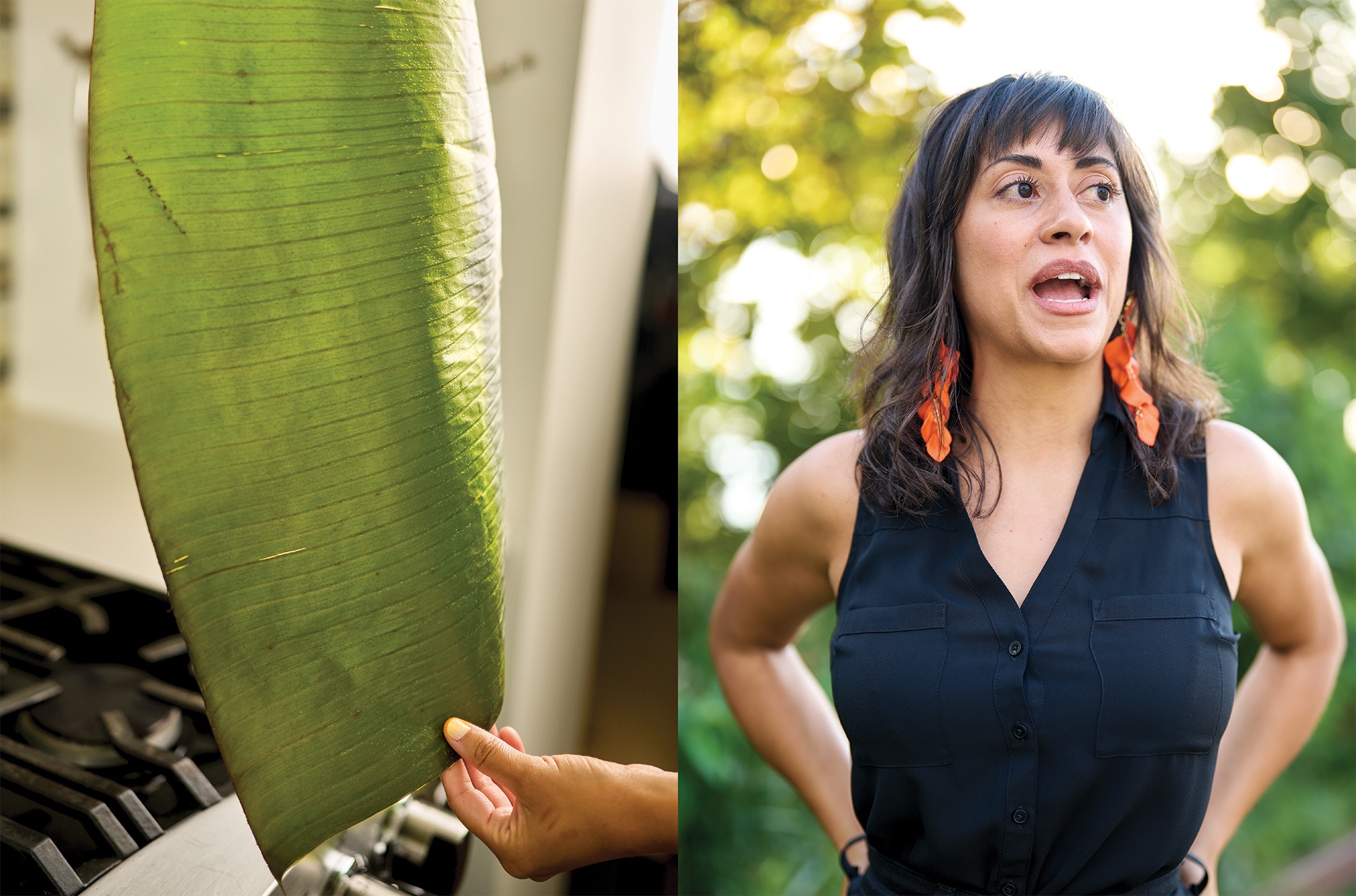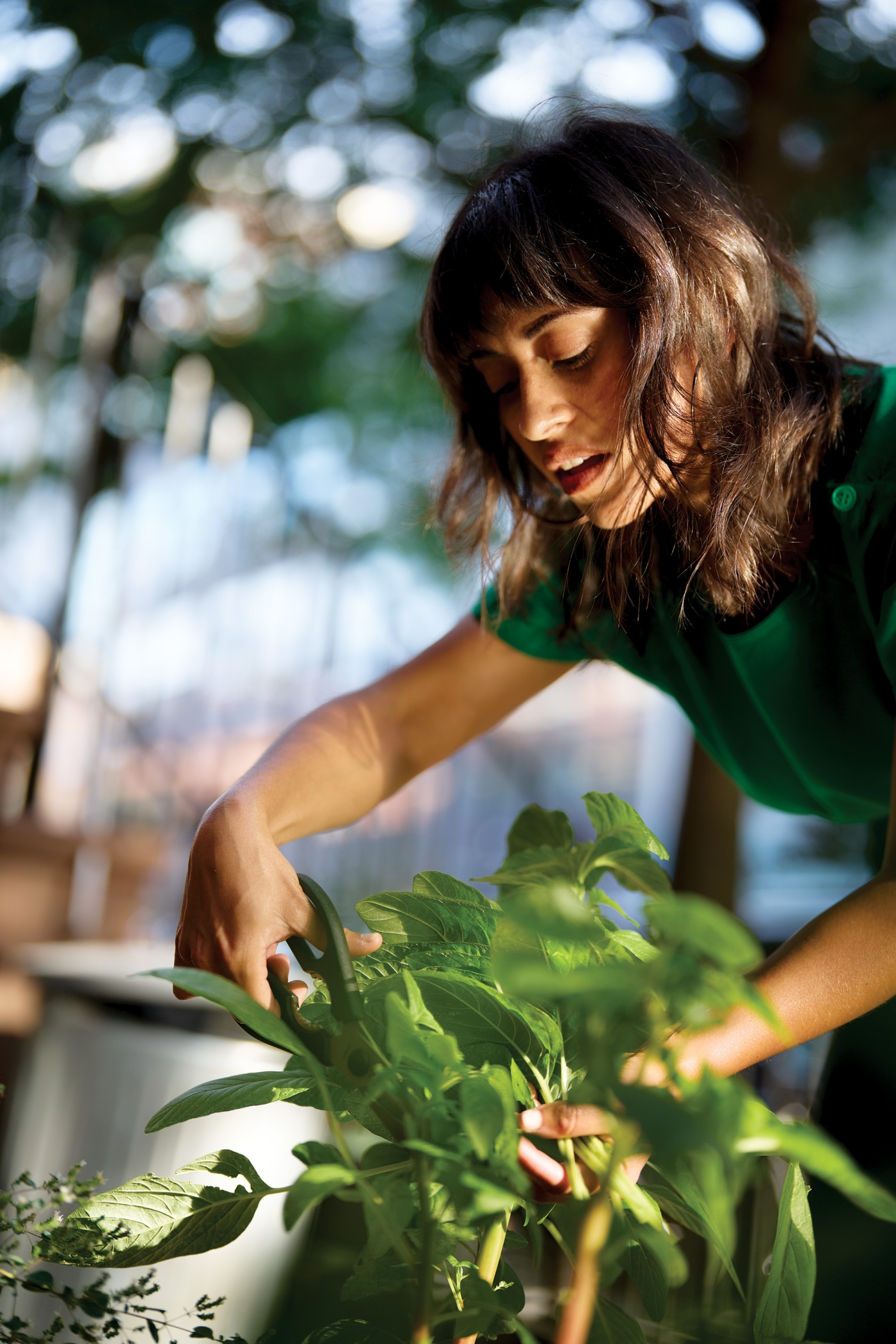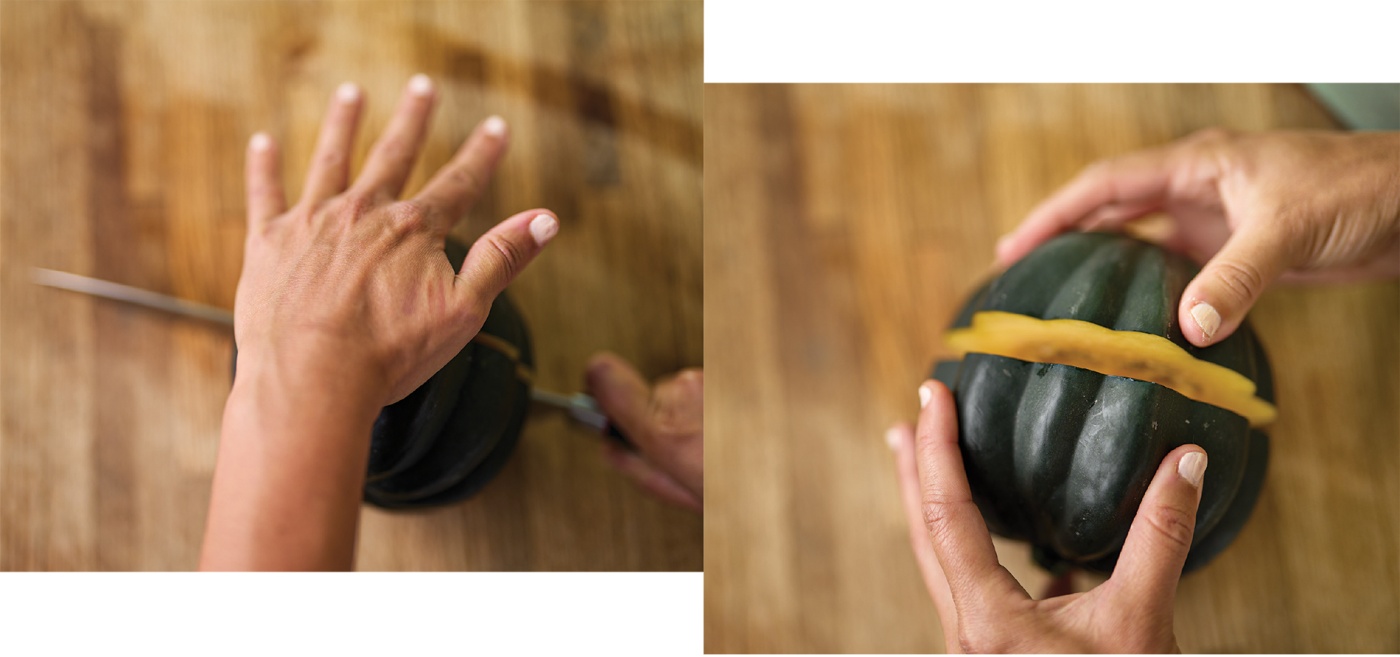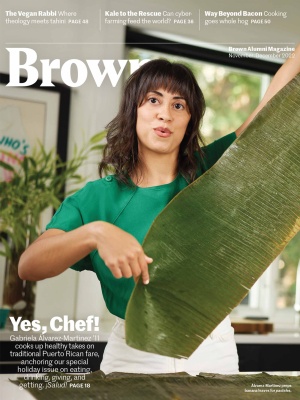
Liberation Cuisine
Chef Gabriela Álvarez-Martinez ’11 draws from her public-health training and her Puerto Rican roots to create delicious food to sustain and heal those trying to change the world—starting with herself.
Fresh out of culinary school, Gabriela Álvarez-Martinez ’11 finds herself hustling to work her way up. Literally. It’s her first catering gig—a 100-person birthday party at a swanky hotel—and she has finally finished the portions of stuffed mushrooms. Tidy rows of shiny metal pans waft a thick current of steam, the roasted scent of creminis mixing with the earthy perfume of corn soup already floating in the air. There’s only one problem now. The kitchen is on the bottom floor; the party is on the rooftop.
Álvarez-Martinez lifts a pan and hauls it towards the elevator, thanking her motley crew of non-chef friends as they follow suit. As they wait through the vertical ride, Álvarez-Martinez reflects upon this all-day, all-hands-on-deck affair. “When you’re first starting off, you have no resources,” she says. “You’re using anything you can and calling everyone in to support you.” Before arriving at the hotel she was working out of her sister’s apartment, her whole family helping to carefully remove the woody stalks from the caps of the creminis. There’s a running joke in the family about the “mushroom soup era,” after Álvarez-Martinez overscaled the mushrooms in the recipe by 20 times, leading her mom to freeze the leftovers for, well, years’ worth of mushroom soup.
Finally, though, Álvarez-Martinez reaches the rooftop. The sunset casts a carrot orange glow on her white chef’s coat as she sets up her station and starts dishing out bowls of the corn soup. The partygoers gush, but she came up confident in her flavors. This is her bread and butter, after all. Plant-based, health-supportive fare rooted in her Puerto Rican background. The nerves really stemmed from pulling it off with the scant resources she had.
She breathes a sigh of relief as she looks out onto the Manhattan skyline, apartment windows lighting up like bubbles in simmering water. One here, then another over there. She hasn’t slept in 24 hours, and the exhaustion in her muscles is finally starting to register. Through the foggy fatigue, a thought emerges. “That was insane,” she says. Then, like another bubble floating to the surface: “Let’s do it again. I’m ready to do a better job next time.”

Álvarez-Martinez did not grow up dreaming of being a chef. She did grow up eating well, in both senses of the term, her mother employing food as sustenance and salve in the traditional Puerto Rican household. Her younger sister Alejandra recalls collaborating on one of Gabriela’s earliest creations: a grass and leaves soup-potion mashed together in a Frisbee. But as Álvarez-Martinez grew wise to sexism and views that the kitchen is “a woman’s place,” her interest waned. She liked the act of cooking, but the social meaning of it didn’t sit right with her.
Only at Brown did that meaning start to change. Desperate for choices beyond the dining halls and Thayer Street, she began cooking for herself as a way to take care of herself. This coincided with exploring food in the classroom; she concentrated in Community Health and attended various nutrition-related classes including Traditional Roots and Modern Medicine, which held its sessions in the rooftop greenhouse at the Institute at Brown for Environment and Society. Her relationship with food got even more serious the summer after her sophomore year, when she was awarded the Swearer Center’s Royce Fellowship to work on a farm in New Hampshire. Little by little, food percolated throughout her life, personal and academic.
By graduation, though, she had not settled on a career path. June of 2011 began particularly hot. While the outside world stewed at 90 degrees, she settled back home feeling slightly lost about her future. Then it all changed with a press of the TV remote. “A friend of mine—we graduated together—was staying with me, and he was really into the Food Network. And it just sort of clicked for me,” Álvarez-Martinez says. Watching chefs on television made her realize their platform and influence, and that fascinated her.
The public health concentrator knew her career had to involve the field, but she was not interested in pursuing a traditional route in a hospital or in an office. “I didn’t necessarily connect so deeply with the approaches we learned in community health classes, but I knew that I cared about humans, society, and well-being,” she says. Given her upbringing, she easily saw how food as medicine translated into cooking as public health work. On screen the pot might’ve still been coming up to boil, but just like that, she had decided. “I’m going to go to culinary school. I’m going to become a chef.”
Through the foggy fatigue, a thought emerges. “That was insane,” she says. Then, like another bubble floating to the surface: “Let’s do it again.”
Cooking for changemakers
Her conviction walked her all the way across the Brooklyn Bridge to the Natural Gourmet Institute, a culinary school (now incorporated into the Institute of Culinary Education) focused on plant-based, health-supportive cooking. It was another obvious decision done in a snap; she signed up the day of her tour. Since she was not immediately able to pay tuition, she first spent two years participating in their work-study program before entering the one-year degree program. With Natural Gourmet’s curriculum, along with practicing knife cuts and other basic kitchen skills, she gained an important “crash course on food as medicine.” She graduated in 2014.
Throughout her time at the Natural Gourmet, Álvarez-Martinez worked at El Puente, a largely Boricua nonprofit combating gentrification and developing youth leadership in Williamsburg, a neighborhood with a long-standing Puerto Rican community. This experience, as well as her time at the Brown Center for Students of Color, opened her eyes to the public health needs of activists. “It’s hard to take care of yourself,” she says, “when you’re trying to put so much energy into taking care of the world.” Upon graduation, she was determined to use her knowledge of food as medicine to support activist spaces. After her first catering gig, she began catering for El Puente events, and word quickly spread in New York’s nonprofit scene.
From there sprung Liberation Cuisine, Álvarez-Martinez’s catering enterprise, which earned her the Superpowered NY honor from Bon Appétit celebrating women redefining wellness. Liberation Cuisine specifically targets social justice nonprofits and other community-based organizations in its clientele. Beyond feeding activists, though, its mission is to highlight the health and nourishment inherent in Puerto Rican and other Caribbean cuisines, all the more important because these cuisines are often stereotyped as unhealthy and full of fried foods. Her customers often belong to these culinary traditions. “As Latinx people, as Caribbean people, I get to feed you with something that nourishes your spirit,” she says.

In the United States there is a sentiment that a healthy diet equates to rabbit food. Álvarez-Martinez does not believe in this mentality, nor does she believe that supercharging meals with healthy ingredients means turning everything green. Describing her rendition of bacalao, a Puerto Rican stew made primarily with salt cod, she recounts: “Often I would put chickpea into the bacalao. I remember I did this one event, and this guy comes up, he’s like, ‘Garbanzos in the bacalao, that’s interesting.’ You know, they’re both protein, and Puerto Ricans love chickpeas.... It’s the same flavor and it’s ingredients we already use.” In essence, why not? How can one bolster the nutrition of traditional dishes while still playing by house rules?
This conversation gestures at a core pillar of her cooking: healthy food does not have a singular label. Buzzwords like vegan, gluten-free, and keto present narrow-minded ways to mark certain foods as good or bad. “We have so many healthy things in our cuisines,” she asserts. “Almost all of our recipes, if they have milk, are with coconut milk traditionally. That’s vegan, y’all. It doesn’t matter what you call it.”
Álvarez-Martinez’s message began to spread as Liberation Cuisine grew at a breakneck pace. Catering requests kept filing in, and as the business’s beating heart, the chef (and administrator, and driver, and custodian) could not relent. Like the elevator ride at her first gig, it seemed that the only way was up. She did not have the time to look down.
Healer, heal thyself
Ping. Another email.
Álvarez-Martinez is back at her family home, where she first decided to become a chef nine years prior. Now the very last thing on her plate is cooking.
She lifts her phone to her face, and the notification thread unfurls. This one’s from Smorgasburg, the largest open-air food market in the United States, which had accepted Liberation Cuisine’s application at the beginning of 2020. At this point, the cancellation is unsurprising, but she’ll have to cancel the order for the giant marquee tent.
In the United States there is a sentiment that a healthy diet equates to rabbit food. Álvarez-Martinez does not believe in this mentality.
The chef, though, is relieved. Running Liberation Cuisine—often cooking ten, twelve, fourteen-hour shifts—had physically and mentally drained her. Her sister Alejandra says, “After she would have her event, she would often have to take days to kind of rest and recuperate and take care of herself.” Even with rest days, usually still requiring administrative work from her, exhaustion had begun to settle in her bones. While the pandemic certainly killed a number of great opportunities, it was the full stop she needed on this seemingly brakeless train.
Chronic illness made Álvarez-Martinez’s self-healing journey even more crucial. In 2016, she was diagnosed with IgA nephropathy, an autoimmune kidney condition that causes a host of nasty symptoms along with inflammation and pain. Resisting pressure to immediately hop on prescriptions, Álvarez-Martinez looked toward her lifestyle habits as a way to heal—sleep, exercise, and obviously diet. While she was conscious of managing the illness during her busiest days at Liberation Cuisine, the grand pause allowed her to reflect on her progress. She was ensuring others were eating well, but was she herself?
“You can ask anyone who works in the food industry. It is so easy to go many hours without using the bathroom, drinking water, or eating anything,” she now says. It’s a common refrain: chefs don’t have time to eat on the clock, and if they do, it’s often standing up, hunched over the trash can.
Burnout is markedly high in the industry. Just days after attending the 2022 James Beard Awards ceremony, Emerging Chef finalist Cleophus Hethington left his chef de cuisine position at Benne on Eagle in Asheville, North Carolina. It was a move of not-so-radical self-care; in an Instagram post he went on to describe his industry as “so broken,” its culture demanding chefs to prioritize service “at all cost of time, rest, recovery.” A chorus of chefs, including Álvarez-
Martinez, responded likewise in the comments.
Álvarez-Martinez now prioritizes a routine of three square meals every day. These meals don’t have to be glamorous; in fact, part of the exhaustion stemmed from the pressure to make each dish, even at home, a masterpiece. Instead she focuses on basic nourishment, playing it simple with smoothies, salads, soups, and her favorite food, sweet plantains.

Herbalism has also been an important aspect of her health routine. While the practice sometimes garners a negative reputation as hippy pseudoscience, various traditions remain a part of primary health care around the world, even influencing modern Western medicine. Naika Apeakorang ’11, a naturopathic doctor and close friend of Álvarez-Martinez, notes how your medicine cabinet may contain more herbalist compounds than you think. The salicylic acid in your face wash, the camphor and menthol in your VapoRub? All originally derived from plants. For her chronic disease Álvarez-Martinez cites herbs like reishi, fo-ti, and astragalus as particularly useful.
Even with lifestyle changes implemented, Álvarez-Martinez does not think she can return to Liberation Cuisine at the same capacity as before. In any case, reopening the business has proven difficult because of the lack of a brick-and-mortar operation. With no physical store, her first catering request came only this past spring. It is high time for Liberation Cuisine, indeed her entire career, to transition.
Food as medicine
At the time of this interview, Álvarez-Martinez is on a brief visit to Puerto Rico. She is staying at her sister’s current residence in the Miramar neighborhood of San Juan. Through the Zoom window, a ceiling fan circulates the sticky air, swaying a hanging pothos plant. The chef is telling the story of her first catering gig with gusto. Her hands span the vertical of the computer screen, gesturing the distance between the bottom and top floors of the hotel. Her hoop earrings jingle back and forth.
Part of the trip’s purpose is to visit family, but part of it is to convene with producers for an upcoming web series that will serve as her final project for the Robert Wood Johnson Culture of Health Fellowship. The three-year program develops leaders from all sectors using their influence to advance health equity. Her approach involves food, unsurprisingly. The videos will spotlight the various ways that food serves as medicine—cooking, growing, herbalism, and so on—with a call to action to “reclaim and sustain that connection to the earth and to our food.”
“What does it mean to honor your ancestry and hold onto that medicine while also connecting with the [new] lands that you’re on?”
Other ventures are also expanding her healing work into new modalities. Starting in 2015,
Álvarez-Martinez was the head chef for the Black and Latinx Farmer Immersion Program at Soul Fire Farm in Petersburg, New York. Along with the other chef at the farm, she is writing a Soul Fire cookbook exploring what it means to cook in a diaspora. Almost always it is impossible to cook traditional dishes exactly as prescribed outside of where those traditions were established. The balance of custom and change is thus at the heart of the book. She asks, “What does it mean to honor your ancestry and hold onto that medicine while also connecting with the lands that you’re on and the fresh food that’s around you?”
So it seems Álvarez-Martinez is taking the transition in stride. If her teenage resistance toward the kitchen was any sign, Álvarez-Martinez’s passion for food is not just about cooking. It’s about how people relate to food, the stories they have about it. Before the pandemic, she had completed a number of pop-up dinners exploring storytelling through food. One, in 2019—hosted by celebrity chef Tom Colicchio—recounted the diasporic experience of Hurricane Maria’s impact on Puerto Rico. Álvarez-Martinez paired each of the six courses with audio and visual narrative, guiding diners through the genesis and aftermath of the devastating storm. At other pop-ups, she’s dabbled with incorporating elements like music and choreography.
Regardless of the paths she pursues in the near future, Álvarez-Martinez asserts that she wants everything she puts out—food, video, writing—to be medicine. She says: “Anywhere, any culture, any cuisine—when you cook with the ingredients that the land provides, that in and of itself is going to be healthy. And so when you turn to and remember and pass down traditional foodways, whether it’s growing, or herbs, or cooking, that’s inherently passing down medicine.” This ideology is something she wants everyone to believe in and to cook by. With our own food, this is medicine that we can all access.
Ethan Pan ’22 is a writer specializing in food and drink, whose work has appeared in 5280, among other publications.





